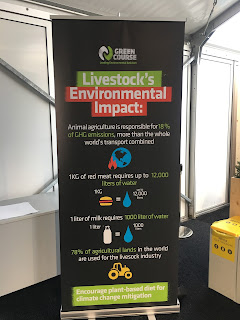Consumer Behavior and our Carbon Footprint
The clothes we buy, the food we eat, the cars we drive, all of the lifestyle choices we make have an impact on our carbon footprint. Consumer behavior can influence our environment and our policy. In order to stop climate change there needs to be a major shift in the way that we buy products and consume materials.
Consumers have the right to make their own decisions about the products they consume. The choice to consume a hamburger can have a vastly different impact than the choice to consume a salad. I attended a session at COP called Green Course in which the presenter stated, “The amount of fossil fuel emissions created in the production of livestock worldwide is around the same as the amount of fossil fuel emissions produced by the entire United States." If Americans chose to consume beans instead of beef-without losing any protein or nutrients- they would contribute to around 75% of the Paris Agreement reduction goals. The livestock industry is one of the leading causes of environmental destruction. But the only way we can stop people from consuming animal products is to influence consumers not to buy them.
The fashion/textiles industry is also a major producer of greenhouse gases; its factories being the second highest producers of fossil fuel emissions behind oil. Here at COP I attended a session called What the Paris Agreement means for fashion companies and their suppliers and I learned that the industry itself is pushing towards sustainability but they are struggling to reach their goals without a consumer push towards climate friendly garments.
Even here at COP people have the power to make informed decisions. Although there are vegetarian and a few vegan options, a lot of the food served in the cafeteria is still meat based. The conference hands out reusable water bottles but still gives people the option of purchasing disposable plastic water bottles and using paper coffee cups instead of mugs.
Summed up, how can we help stop climate change? Every day we have the power to make environmentally sound decisions that impact our carbon footprint. We can make as many emission reduction goals as we want but we aren't going to solve our climate issue unless we influence consumers to make an informed shift towards sustainably produced goods.
Consumers have the right to make their own decisions about the products they consume. The choice to consume a hamburger can have a vastly different impact than the choice to consume a salad. I attended a session at COP called Green Course in which the presenter stated, “The amount of fossil fuel emissions created in the production of livestock worldwide is around the same as the amount of fossil fuel emissions produced by the entire United States." If Americans chose to consume beans instead of beef-without losing any protein or nutrients- they would contribute to around 75% of the Paris Agreement reduction goals. The livestock industry is one of the leading causes of environmental destruction. But the only way we can stop people from consuming animal products is to influence consumers not to buy them.
The fashion/textiles industry is also a major producer of greenhouse gases; its factories being the second highest producers of fossil fuel emissions behind oil. Here at COP I attended a session called What the Paris Agreement means for fashion companies and their suppliers and I learned that the industry itself is pushing towards sustainability but they are struggling to reach their goals without a consumer push towards climate friendly garments.
Even here at COP people have the power to make informed decisions. Although there are vegetarian and a few vegan options, a lot of the food served in the cafeteria is still meat based. The conference hands out reusable water bottles but still gives people the option of purchasing disposable plastic water bottles and using paper coffee cups instead of mugs.
Summed up, how can we help stop climate change? Every day we have the power to make environmentally sound decisions that impact our carbon footprint. We can make as many emission reduction goals as we want but we aren't going to solve our climate issue unless we influence consumers to make an informed shift towards sustainably produced goods.


Thank you for these inspirational words, Megan. I couldn't agree with you more. There is a lot of power in our choices as consumers.
ReplyDelete